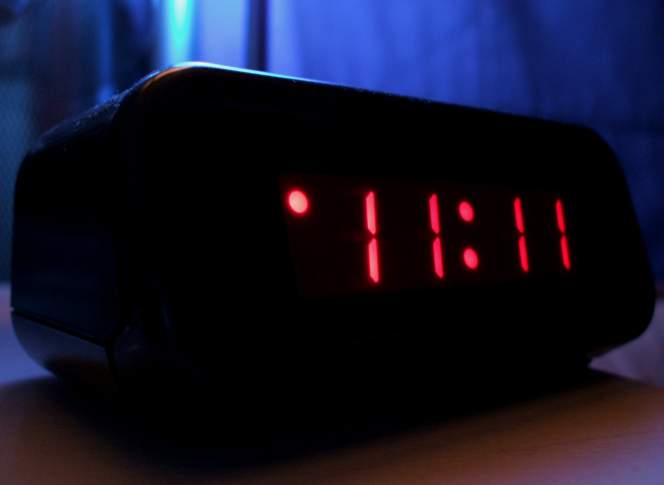Poor Sleep Isn't Inevitable For Older Adults
While sleep difficulties are a common factor in aging, older adults don’t need to resign themselves to a life of poor or erratic sleep.
January 2, 2018

Digital alarm clock at 11:11 and blue light

Wisconsin’s population of older adults is growing around the state, and with aging comes a multitude of challenges for health and quality of life. For many older adults, problems with sleep can be an aggravating factor for or consequence of a variety of other health issues.
While sleep difficulties are a common factor in aging, older adults don’t need to resign themselves to a life of poor or erratic sleep, says Steven Barczi, a professor of geriatrics at the University of Wisconsin School of Medicine and Public Health.
A good night’s sleep is an essential element of good health, and all kinds of decisions a person makes — from exercise and eating habits to what kinds of medications one takes — can help a troubled sleeper get back on track. Barczi detailed the many health and lifestyle factors that impact sleep, and especially that of elderly patients, in a Sept. 15, 2016 talk at the Oakwood Village retirement community on the west side of Madison. His talk was recorded for Wisconsin Public Television’s University Place program.
Barczi discussed the physiological basics of sleep, and described some of the basic factors physicians look at when helping patients tackling sleep problems. Healthy sleeping patterns can help people to boost their immune system, reinforce learning and memory, control appetite, and build up proteins needed for the following day’s brain activity.
As people age, they tend to experience some deterioration in their sleep cycles, including a reduction in the deeper phases of sleep, more fragmented sleep, and a tendency to both go to sleep and wake up slightly earlier. But older adults still require about seven or eight hours of sleep to remain healthy. At most, the change in a person’s sleep needs between early adulthood and old age might be 30 minutes or an hour, despite some older adults’ beliefs that they need significantly less sleep.
Barczi recommended the National Sleep Foundationas a useful resource for people looking to get a better night’s sleep, and emphasized that making a change often begins with simple but important lifestyle changes.
Key facts
- People complain about sleep problems more frequently as they age. These difficulties can include trouble falling asleep, nighttime or early-morning awakenings, and daytime sleepiness. Between one study in 1976 and another in 2004, there was surprisingly little change in how sleep issues appeared to become more prevalent as people aged.
- A 2003 survey of older adults found that a majority rated their sleep quality as “good,” “very good” or “excellent,” outweighing those who rated their sleep as “poor” or “fair.” These findings contradicts received wisdom that older adults inevitably experience poorer sleep.
- Most people sleep better in a cooler environment.
- At all ages, women are more likely than men to experience sleep problems.
- Sleep depends on a strong and positive emotional association with beds, and some people can feel more negative and alert after they get into bed.
- A mix of predisposing factors and environmental factors can contribute to how well a person sleeps, and sometimes even a minor stress can make the difference between a good night’s sleep and insomnia.
- Poor sleep habits commonly include having a shortened sleeping schedule, a poor bedroom environment, excessive daytime napping, a lack of daytime activity and exercise, inadequate sun or bright light exposure during the day, and caffeine, tobacco or alcohol use.
- Napping can play a positive role in healthy sleep habits, and some research even suggests that people who nap have better memory than people who do not.
- Sticking to a schedule — not just with bedtimes, but also with eating, exercise, and naps — is an important factor in maintaining a healthy sleep pattern. For purposes of sleep, the best time to exercise is in the afternoon, somewhere between 2 and 5 p.m. This schedule allows a person’s body temperature more time to decrease as they move toward sleep.
- As alcohol is metabolized, a person’s energy levels rise, which might cause a person to wake up more often throughout the night.
- People with common health issues — including high blood pressure, heart disease, diabetes, depression and arthritis — are more likely to experience insomnia. Serious memory problems and mental illnesses, including post-traumatic stress disorder, can also create sleep problems. Many common medications can disrupt sleep, from beta blockers to benzodiazepines. Several medications also contain caffeine, sometimes even more so than a cup of coffee depending on dosage.
- There are dozens of known sleep disorders, but most people experiencing sleeping problems have one of 10 or so that are fairly common. These disorders include sleep apnea (interruptions to breathing during the night), limb movements, restless legs and REM sleep behavior disorder. Sleep disorders affect other health conditions. For instance, sleep apnea can aggravate high blood pressure, make it harder to control diabetes and increase the risk of stroke.
- Cognitive behavioral therapy is among the most effective treatments for insomnia.
Key quotes
- On sleep and aging: “One of those great myths that’s been out there for a long time is that, inevitably, as we get older our sleep will become poorer. And, in fact, I’m sure if I did a show of hands in this room, there would be a handful of you who would say, ‘I’m quite satisfied with my sleep and it’s not an issue.’ Although, I am pretty confident that if I did a hand count on to how many people struggle, either on an occasional basis or on a regular basis, with sleep, there would be more hands. But, again, as I’m saying, there are ways by which at any age we have the potential to improve our sleep quality.”
- On the mental impact of sleep: “When we sleep, we are also remodeling some of the networks, the neural networks in our brain that help us to be able to deal with emotional stimuli. And when we sleep deprive individuals of any age and the next day we irritate them just a little bit, they are much more emotional in their responses to us. And that happens to be associated with a very specific area of the brain called the amygdala. So, without getting into a lot of technical jargon, I can tell you that by sleeping better, our emotional state the next day is also better.”
- On the broader significance of sleep for health: “We know that people who maintain healthy lifestyles, which include quality sleep, good exercise or activity schedules, avoidance of some of those vices that can get all of us into trouble, will, on average, have half the risk of disability as they age compared to those who maybe weren’t maintaining some of those healthy practices.”
- On poor sleep habits: “It’s not because we necessarily want to sleep poorly. It’s more because life is complicated and things happen and we tend to shift various activities, and so, in effect, our habits can become poor, not because we necessarily wanted it to happen that way.”
- On the importance of people’s association with their beds: “Some of you may struggle to get to sleep and might lie awake for an extended period of time in bed. But because you’re not getting the amount of sleep you think you need, you’re going to stay in bed, waiting for the moment when you’re going to slip to sleep. The challenge, of course, is that if you spend 12 hours of time in bed and only sleep for five or six hours, what is your brain to learn about the bed? It’s a great place to be awake. Not necessarily a place for retiring and actually withdrawing and falling asleep.”
- On improving sleep: “Ultimately, who is responsible for this process of improving one’s sleep? And, in the end, as much as you might have an exceptional healthcare provider, it’ll probably start first with you. And so remember at the beginning I had challenged all of you to think about maybe one, maybe two things that they might do to improve their sleep. For some of you, it might be just having a conversation with your healthcare provider. For some of you, it might be focusing on a couple of those sleep habits that I had talked about. For some of you, it might be talking to your pharmacist or doctor to say, ‘Are there any medicines on this list that could be directly interfering with my sleep quality in one way or another?’ So, ultimately, it’s a team process, but you all will probably have to be the initial instigator as you decide, is your sleep the way it should be.”
 Passport
Passport











Follow Us